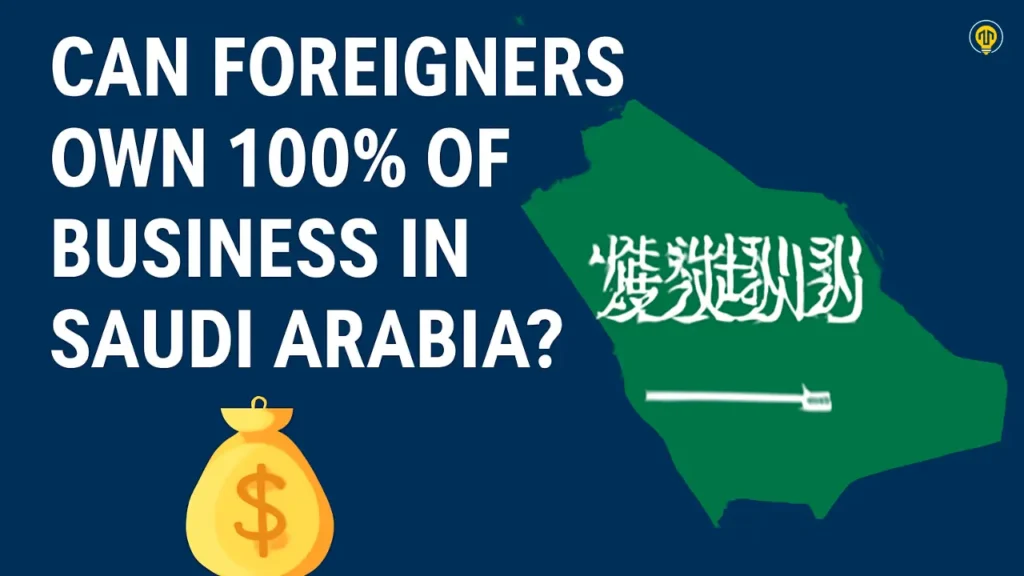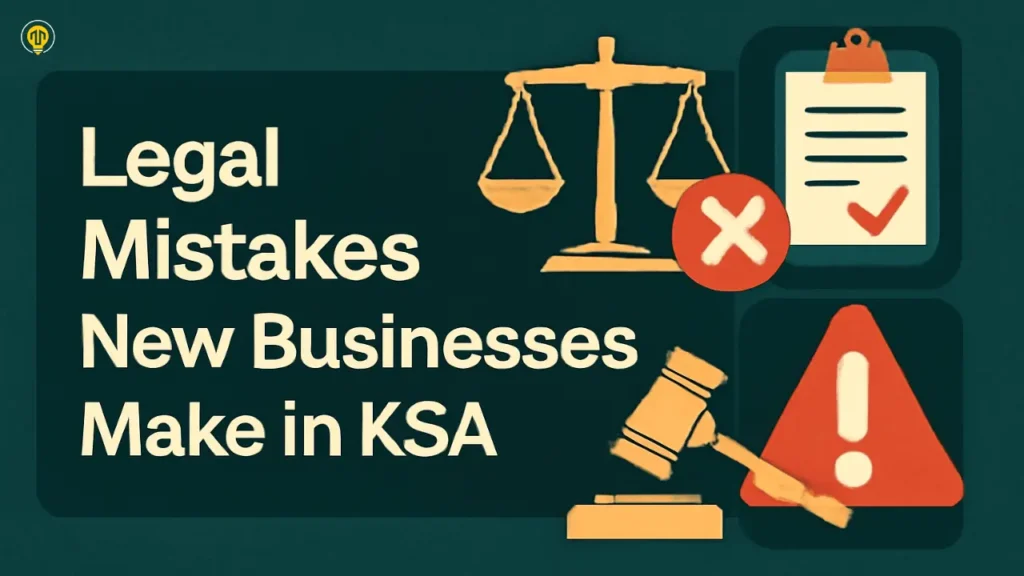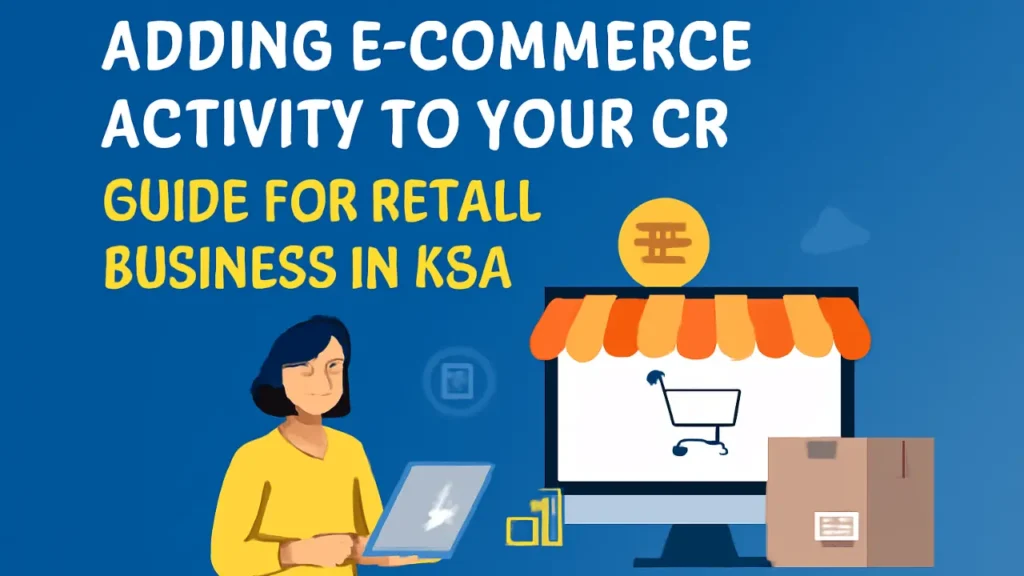Understanding the ‘Service Activity only’ CR: What it means and who should use it

Thinking about registering your business but not sure what a ‘Service Activity Only’ CR means? This guide breaks down exactly what it is, why it matters, and who should consider using it. Whether you’re a freelancer, consultant, or small service provider, understanding this type of registration can help you make the right move for your business.
Can Foreigners Own 100% of Business in Saudi Arabia? Full MISA Policy Breakdown

Have you ever wondered if foreigners can fully own a business in Saudi Arabia? For years, foreign ownership laws in the Kingdom were restrictive, and foreign investors could not own more than 49% of a business. This meant that a Saudi national was required to hold the majority stake in any business established by a foreign investor. However, a significant change has recently occurred, with Saudi Arabia now allowing 100% foreign ownership in many sectors. This new rule presents exciting opportunities for global entrepreneurs and investors. In this blog, we will break down what this change means for foreign businesses and explore the sectors where full foreign ownership is permitted. The Ministry of Investment (MISA) has been at the forefront of these changes, opening doors for international businesses to establish themselves without the need for local partners. This reform is a key part of Saudi Arabia’s Vision 2030, a program aimed at diversifying the Kingdom’s economy and attracting more foreign investments to lessen its dependency on oil. So, what does this mean for you? Whether you’re a seasoned investor or just starting to explore the Saudi market, the new foreign ownership rules give you an unprecedented opportunity to fully own and control your business. From retail to technology, healthcare to entertainment, there are several sectors in which foreign ownership is no longer a restriction. Let’s explore how you can leverage these changes and successfully set up your business in Saudi Arabia. Understanding Saudi Arabia’s Business Ownership Regulations Foreign ownership laws in Saudi Arabia have undergone significant changes in recent years, allowing for 100% foreign ownership in certain industries. Let’s dive into how these new regulations have evolved and what they mean for investors. A Look Back at How Business Ownership Has Evolved in Saudi Arabia Recent Changes in Ownership Laws What Does This Mean for Foreign Entrepreneurs? These changes are part of Saudi Arabia’s broader efforts to diversify its economy and reduce its reliance on oil exports. MISA: A Deep Dive into the Ministry of Investment’s Role The Ministry of Investment (MISA) is your go-to resource when it comes to making foreign investment easier and smoother in Saudi Arabia. It helps international investors understand the regulatory landscape and guides them through the business setup process. MISA’s Mission and Responsibilities Support Offered by MISA MISA’s Role in Vision 2030 For foreign investors, MISA is the first point of contact in Saudi Arabia, providing a one-stop service for everything from business setup to ongoing support. Which Industries in Saudi Arabia Allow 100% Foreign Ownership? One of the biggest wins for foreign investors in Saudi Arabia is that you can now fully own your business 100%, no local partner needed. But which industries in Saudi Arabia actually permit this? While it’s not applicable across every sector just yet, MISA has identified key industries where foreign ownership is fully permitted. These sectors offer some of the most lucrative opportunities for investment. Let’s explore these sectors where foreign businesses can operate without the need for a local partner. 1. Technology Saudi Arabia is actively working towards becoming a technology hub in the Middle East, and it’s a sector that is now open to 100% foreign ownership. 2. Retail and E-Commerce The retail and e-commerce sector in Saudi Arabia is experiencing significant growth, driven by a young population and a shift toward online shopping. 3. Healthcare With the Saudi government heavily investing in modernizing its healthcare system, the sector has opened up for 100% foreign ownership, making it an attractive opportunity for global investors. 4. Entertainment and Media Saudi Arabia is undergoing a transformation in its entertainment and media landscape, driven by a government push to create a more vibrant cultural scene. As a result, this sector is growing rapidly, and foreign businesses now have the opportunity to fully own their operations. While some industries are still restricted, Saudi Arabia offers a wealth of opportunities for foreign investors to own 100% of their businesses, particularly in technology, retail, healthcare, and entertainment. If you’re considering entering the Saudi market, these are the sectors where you can benefit from full ownership, offering unparalleled growth and investment prospects. Non-Saudi Business Ownership Regulations in Saudi Arabia Saudi Arabia has historically had stringent regulations regarding foreign ownership of businesses. However, with the implementation of Vision 2030 and reforms to attract global investment, the country has significantly relaxed its rules for non-Saudi investors in recent years. If you’re a foreign entrepreneur planning to start a business in the Kingdom, getting a clear handle on these regulations is absolutely essential. 1. General Rule: Limited Foreign Ownership Not long ago, foreign investors had to team up with a Saudi partner to own a business in the country. But recent reforms have started to change that. This meant that non-Saudis could only own up to 49% of a business, while the Saudi partner would own the remaining 51%. This arrangement was primarily designed to ensure that local businesses maintained a strong foothold in the country’s economic landscape. 2. Revised Regulations for Foreign Ownership The most significant change in Saudi Arabia’s foreign ownership rules is the ability for non-Saudis to own 100% of certain businesses in specific sectors. These reforms, largely driven by the Ministry of Investment of Saudi Arabia (MISA), were designed to make Saudi Arabia a more attractive destination for foreign investors, especially as the Kingdom aims to diversify its economy away from oil dependence. Key Points of the New Regulations: In industries like tech, retail, healthcare, manufacturing, entertainment, and hospitality, foreign investors can now fully own their businesses with no local partner required. This has opened up numerous opportunities for foreign companies looking to establish themselves in the region. MISA has made it easier for foreign investors to set up businesses through simplified procedures and improved transparency in the registration process. Foreign investors no longer need to have a local sponsor to start a business in many sectors, especially in special economic zones. The new laws allowing 100% foreign ownership in Saudi
Local City Solutions Growth Plan: How We Help Startups Go from Launch to Lead.

Starting a startup is exciting, but growing it takes the right plan and support. In this post, we’ll show how Local City Solutions helps startups move smoothly from launch to generating leads and building momentum.
Most Common Legal Mistakes New Businesses Make in KSA (And How to Avoid Them)

Starting a business in Saudi Arabia is exciting, but missing a few key legal steps can lead to big headaches down the road. In this post, we’ll walk you through the most common legal mistakes new businesses make and how you can avoid them to stay on the right track from day one.
How to Open a Company Branch in Another City in KSA (with the Same CR)

Opening a company branch in another city in Saudi Arabia with the same Commercial Registration (CR) might sound like a complicated process, but it’s actually a more straightforward task than many business owners realize. Whether you’re a local entrepreneur or a foreign investor, expanding your business into new cities in Saudi Arabia offers incredible growth opportunities. Not having to get a new CR for each branch makes it even easier for companies to scale and operate in multiple locations across the Kingdom. But how exactly can you take advantage of this opportunity? In Saudi Arabia, the process of opening a company branch in a new city while keeping your existing CR is perfectly legal, efficient, and encourages businesses to spread their wings. By understanding the regulatory framework, the key steps involved, and the necessary documentation, you can easily tap into new markets without the need for an entirely new registration process. This is particularly appealing for businesses already established in one city and seeking to extend their reach to others within the Kingdom. One of the best parts about this process is how seamless it is. Rather than facing hurdles such as getting new licenses or starting from scratch with an entirely new CR, you can simply expand your operations to another city using the same registration. However, like any business expansion, it requires careful planning and understanding of the local laws and processes. This guide will walk you through everything you need to know about setting up a branch in another city, from legal requirements to the documents needed for successful registration. Understanding the Legal Framework for Branch Expansion in KSA When you’re growing your business in Saudi Arabia, it’s important to understand how the legal side of things works especially when it comes to opening branches in different cities. The good news? You don’t need to apply for a brand-new Commercial Registration (CR) for each branch. The Saudi government makes it easier by allowing businesses to expand with branches under the same CR. This process is simplified by the fact that your CR, once registered, applies to all your operations within the Kingdom, including any new branches you open. However, it’s not just about filling out a few forms. The legal process ensures that your business complies with Saudi Arabia’s commercial laws, offering stability and transparency to foreign investors and local entrepreneurs alike. The Ministry of Commerce and Investment (MCI) oversees this process, providing businesses with the support they need to grow while staying within the bounds of the law. The key here is understanding how your CR operates and how it can be applied to multiple cities. As long as your CR remains valid and your business is in good standing, opening a new branch becomes a matter of submitting the right paperwork, ensuring that you’ll just need to make sure the new location follows local regulations and that you get the required approvals before opening your doors. The simplicity of this process is one of the reasons why many businesses look to expand their footprint across the Kingdom without starting the entire registration process from scratch. Prerequisites for Opening a Company Branch in Another City in KSA Before you set your sights on a new city in Saudi Arabia, there are several prerequisites you need to meet to ensure your business is ready for expansion. The first and foremost requirement is ensuring that your current CR is up to date and in good standing with the authorities. Without a valid CR, you cannot proceed with the branch opening process. Additionally, you need to evaluate whether your business model is suited for expansion. Simply put, does your business have demand beyond the city it’s currently operating in? In addition to these foundational checks, you’ll need to ensure that you have the necessary physical infrastructure in place. For example, securing office space is crucial. The new location must comply with zoning laws, and you’ll need a registered address for your branch. Depending on what your business does, you might need a few extra licenses or permits to operate in the new city. It all comes down to the type of services or products you’re offering. These could range from environmental clearances to specific business operating permits that are unique to the area. Furthermore, it’s essential to confirm that the city you want to expand into has a market demand for your services. This means evaluating the competition, customer demographics, and any regional trends that could affect your success in the new location. Finally, make sure that your business has the financial capacity to handle the expansion. This means making sure you’ve got enough funds to get started—everything from setting up the space to handling day-to-day expenses at your new branch. Step-by-Step Process to Open a Company Branch in Another City (With the Same CR) Opening a company branch in a new city in Saudi Arabia involves a series of well-defined steps. While the process is straightforward, following these steps correctly ensures that everything is done legally and efficiently. Step 1: Check Eligibility The first step is to make sure your business is eligible for expansion. This means confirming that your CR is active and free of any legal or financial issues. It’s important to ensure that your business model can cater to a larger audience beyond your original location. Step 2: Submit Request to MCI The Ministry of Commerce and Investment (MCI) plays a central role in the branch registration process. You’ll need to submit a formal request to open a branch, detailing the nature of the business and the city in which you plan to operate. Step 3: Prepare the Necessary Documents Gather all required documents such as an updated CR, proof of office space, and any other licenses or certifications that might be needed. Be sure your business plan outlines the operations of your new branch. Step 4: Receive MCI Approval Once your documents are submitted and reviewed, MCI will approve your request. This could
Adding E-commerce Activity to Your CR: Guide for Retail Business in KSA

Thinking of selling online in Saudi Arabia? If you already have a Commercial Registration (CR), adding e-commerce activity is easier than you think. This guide walks you through the process step by step—no legal jargon, just clear instructions to help you expand your retail business online the right way.
How to Market Your Newly Registered Business in Saudi Arabia (Even With Zero Budget)

Starting a new business in Saudi Arabia is exciting but what if you have little to no budget for marketing? Don’t worry. This guide shares practical, no-cost strategies to help you build brand awareness, reach your audience, and grow your business without spending a riyal. Whether you’re a solo entrepreneur or a small team, these tips are made to work with what you have.
What Makes a Business Name Memorable in Saudi Arabia? Branding Tips for Approval

Choosing the right business name in Saudi Arabia isn’t just about creativity it’s also about making a strong first impression and meeting approval guidelines. In this blog, we’ll explore what makes a name truly memorable and how to align it with local branding rules to boost your chances of success.
Local City Solutions Insights: Most Rejected Business Names in 2025 and Why

Choosing the right business name is one of the most exciting yet challenging tasks for any entrepreneur. A name is the first thing customers will associate with your brand, and it plays a crucial role in your business’s success. However, in 2025, many businesses face the unexpected challenge of having their names rejected during the registration process. So, why does this happen? The reasons for business name rejection have evolved over the years, and understanding these trends is key to avoiding this setback. In this blog, we will explore the most common reasons for business name rejection in 2025, shedding light on the mistakes many entrepreneurs make when choosing their business names. Whether you’re starting a new venture in Saudi Arabia, the wider GCC region, or beyond, having a deep understanding of these issues can help you avoid unnecessary delays and costs. With stricter regulations and higher competition, it’s more important than ever to ensure that your business name is distinctive, legal, and aligned with your brand. We will not only look at examples of rejected names but also dive into the regulatory, cultural, and trademark-related reasons behind these rejections. By the end of this post, you’ll be armed with the knowledge and tools needed to pick a name that is both compliant with legal requirements and reflective of your business’s identity. So, let’s dive into the world of business name rejection in 2025 – and learn how to pick a name that will pass the test! Why Business Names Get Rejected in Saudi Arabia and Globally Business name rejection is a common issue that many entrepreneurs face, especially in regions like Saudi Arabia, where the rules around business name registration are stricter than in other parts of the world. Understanding why business names get rejected can save you a lot of time and effort during the registration process. Let’s break down the key reasons for rejection both globally and within Saudi Arabia. Legal Restrictions: One of the main reasons for business name rejection is the violation of legal restrictions. In Saudi Arabia, business names must comply with the Ministry of Commerce’s regulations, which include guidelines on what words or phrases are permissible. For example, you can’t use words that are offensive, controversial, or misleading. In many countries, business names that are too similar to an existing trademark will also face rejection due to intellectual property rights. Cultural Sensitivities: In Saudi Arabia and other Middle Eastern countries, cultural and religious factors play a big role in what is considered an acceptable business name. Words related to alcohol, gambling, or anything deemed inappropriate by local customs can be quickly rejected. In many cases, words that may have a positive meaning in one culture may have an entirely different connotation in another. Generic or Overused Names: Another reason for rejection is the use of generic names like “Tech Solutions” or “Creative Agency”. These names are not distinctive enough to help a business stand out and often fail to pass the scrutiny of regulators, especially in competitive markets like Saudi Arabia. When choosing a name for your business, it’s essential to consider legal, cultural, and originality factors to avoid rejection. Understanding these rules can give you the upper hand in ensuring that your name is approved swiftly. Most Commonly Rejected Business Names in 2025 In 2025, several patterns have emerged regarding the types of business names that are most commonly rejected. Whether due to legal reasons, cultural insensitivity, or simply being too generic, many names fall short of the criteria needed to pass the registration process. Here are a few examples of business names that have been rejected this year and why: The Best Tech Solutions At first glance, this name might seem like a solid choice, but it suffers from a major flaw: it’s too generic. The word “best” is subjective and doesn’t convey any unique qualities about the business. It’s overused in the tech industry, and names like this do not make a brand stand out. Regulatory bodies often reject such names for being too similar to others in the industry. Global Enterprises This name, while seemingly professional, has a significant issue. It uses the term “global” in a vague manner that doesn’t reflect the true scope of the business. Many businesses choose terms like “global” to sound more expansive, but if a company only operates locally, the name may mislead customers. In Saudi Arabia, such names are often flagged for misleading customers about the business’s reach. Unique Designs While “unique” might sound appealing, it’s often considered unverifiable. Names that claim to be “unique” but don’t provide tangible proof can be flagged. The word “unique” is often overused and fails to give specific insight into what the business does, making it more likely to be rejected. Mecca Motors It was rejected for using the sacred name “Mecca,” as Saudi regulations prohibit using names of holy sites for commercial purposes to maintain religious respect. Jihad Enterprises It faced rejection due to the inclusion of the word “Jihad,” which carries sensitive religious and political implications and is not suitable for business branding. Royal Falcon Logistics The sole cause of its rejection is for using the word “Royal,” which falsely suggests affiliation with the Saudi royal family, violating trade name laws. Al-Qaeda Tech Solutions Al-Qaeda Tech Solutions was rejected because its name closely resembles that of a known terrorist organization, violating public safety, order, and morality standards. Prophet’s Choice Catering It was rejected for including the word “Prophet,” which is prohibited in business names to prevent misuse of religious titles. Hijab Hotties Fashion It was rejected for blending the religious term “Hijab” with slang “Hotties,” creating an inappropriate and culturally offensive impression. ISIS Innovations The irony of fate behind its rejection is because its acronym matches a globally known terrorist group, causing public discomfort and violating national security standards. Kaaba Constructions It was rejected for using the name of the holy site “Kaaba,” which is strictly protected from any commercial use under Saudi
How to Change Business Activities in Your Existing Saudi CR (Without Penalty)

Changing the activities listed in your existing Saudi Commercial Registration (CR) can be a smart move for any business. Whether you’re adjusting to new market demands, expanding your services, or pivoting in a new direction, updating your CR is often necessary. However, many business owners worry about facing penalties or dealing with complicated processes. The good news is that you can change your business activities in Saudi Arabia without penalties, as long as you follow the right steps. Understanding how to change business activities in your Saudi CR is crucial for staying compliant with local laws while positioning your business for success. Saudi Arabia’s business landscape is evolving rapidly, and adapting your CR ensures that you are aligned with both your business goals and the legal framework. But what exactly is involved in this process? How can you avoid mistakes that could cost you time or money? This article will guide you through the process, explaining everything from the required documents to the steps for a smooth, penalty-free update. Whether you’re a local entrepreneur or an international investor, knowing the right way to modify your CR can save you headaches down the line. If you’re curious about how to update your Saudi CR and avoid the risk of penalties, you’re in the right place. Keep reading to discover a simple, clear, and effective way to navigate the process and make the changes that best suit your business. Why Would a Business Need to Change Its Activities in Saudi Arabia? Changing your business activities in Saudi Arabia is more than just a technical update to your Commercial Registration (CR) ; it’s often a strategic move to keep up with market trends or realign your operations. There are several reasons why a business might decide to make this change, and understanding them can help you determine if it’s the right decision for your company. 1. Market Expansion and New Opportunities As businesses grow, they often explore new markets or industries. For example, if you initially registered your business as a retail operation and later decided to offer consulting services, you may need to update your CR. Changing your activities allows you to legally expand your offerings without running into regulatory issues. 2. Diversification and Product/Service Adaptation Another common reason for changing business activities is diversification. Businesses frequently adapt their products or services to meet evolving customer demands. For instance, a technology company might start offering software solutions alongside hardware products. To reflect these new offerings in your CR, you’ll need to update your business activities accordingly. 3. Compliance with Saudi Vision 2030 Saudi Arabia’s Vision 2030 has sparked a wave of changes across industries. The government is keen on fostering innovation and development in sectors like tourism, entertainment, and technology. If your business is diversifying or shifting into one of these sectors, updating your CR ensures that you are in line with the country’s strategic goals. In short, changing your business activities can be a sign of growth and adaptation to the marketplace. By keeping your CR up to date, you’re not only staying compliant but also positioning your business for success in a dynamic business environment. The Legal Framework Surrounding Changes in Business Activities in Saudi CR Changing your business activities in Saudi Arabia involves navigating a well-established legal framework. Understanding these regulations is essential to ensure that your business remains compliant and operates smoothly after the update. Key Authorities Involved: Understanding Industry-Specific Regulations: Certain sectors require additional oversight, including: Why This Framework is Important: The Saudi legal system ensures that any business operating within its borders is adhering to national policies. By aligning with the framework, your business can grow without the risk of legal complications or penalties. By understanding these key institutions and regulations, businesses can update their CR smoothly while staying compliant with Saudi law. Can You Change Your Business Activities Without Incurring Penalties? The simple answer is YES. One of the most pressing concerns for business owners is whether changing their business activities in Saudi Arabia will result in penalties. The good news is that you can make changes to your CR without penalties, as long as the process is followed correctly. How to Avoid Penalties: Mistakes to Avoid: By following the correct steps and working with the relevant authorities, you can ensure a smooth update to your business activities without the risk of penalties. The Step-by-Step Process to Change Business Activities in Your Existing Saudi CR Changing your business activities in Saudi Arabia may seem complicated, but if you follow a clear step-by-step process, it can be a smooth and efficient experience. Here’s how to get started: Step 1: Assessing the Business Activity to be Changed The first step is to assess what changes need to be made to your existing business activities. Whether you’re expanding into new services or products, or eliminating outdated ones, it’s crucial to evaluate the impact these changes will have on your business operations. Make sure that the activities you want to add or modify are available in the Saudi CR options. Step 2: Preparing Documentation and Necessary Approvals Before submitting your request, gather all the required documentation. This may include a business plan, proof of financial stability, and any specific licenses or permits related to the new activities. Depending on your industry, additional approvals from regulatory bodies like SAMA or the Ministry of Health may be required. Step 3: Submitting the Change Request Once everything is in order, submit your change request to the Chamber of Commerce. To move forward, you’ll need to fill out an application form and provide the necessary documents. Just make sure to double-check everything to help avoid any delays. Step 4: Waiting for Approval Once submitted, the MISA and other relevant authorities will review your application. Depending on how big the changes are, the process could take anywhere from a few days to a few weeks. It’s a good idea to stay on top of your application status and be ready to provide any

